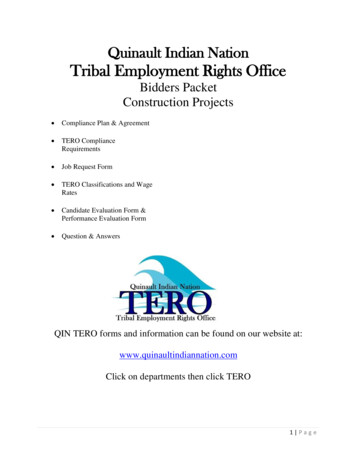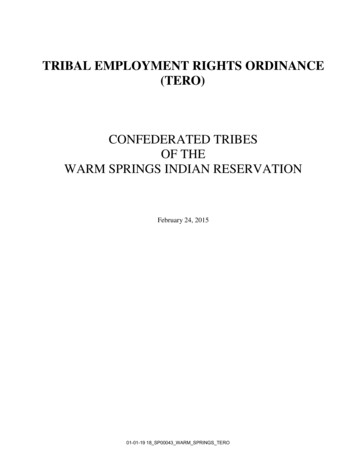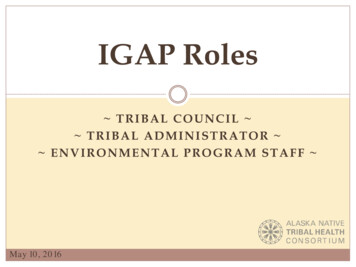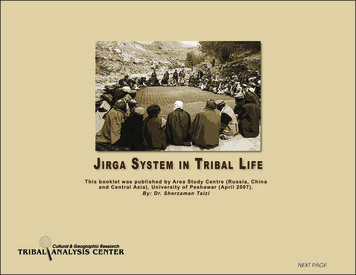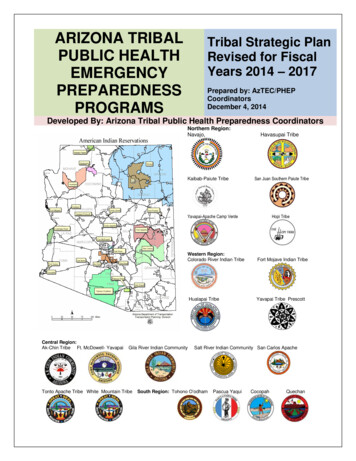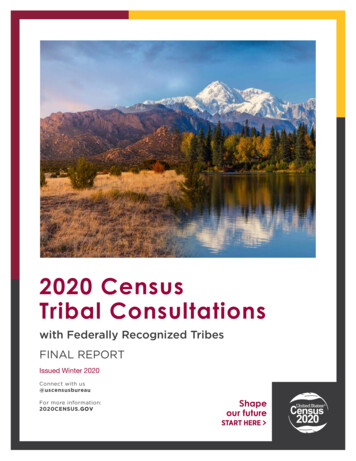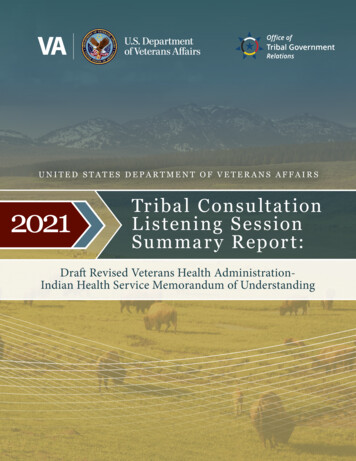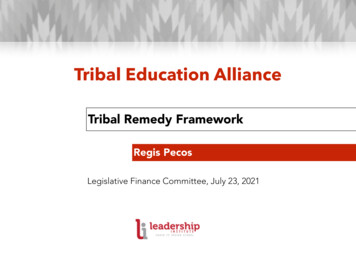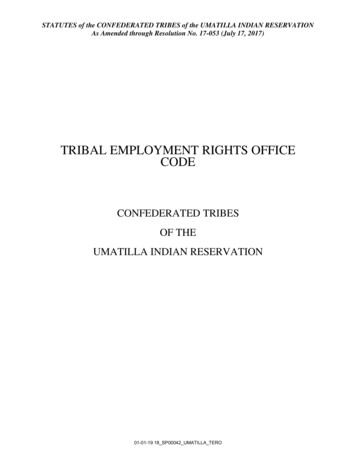
Transcription
STATUTES of the CONFEDERATED TRIBES of the UMATILLA INDIAN RESERVATIONAs Amended through Resolution No. 17-053 (July 17, 2017)TRIBAL EMPLOYMENT RIGHTS OFFICECODECONFEDERATED TRIBESOF THEUMATILLA INDIAN RESERVATION01-01-19 18 SP00042 UMATILLA TERO
STATUTES of the CONFEDERATED TRIBES of the UMATILLA INDIAN RESERVATIONAs Amended through Resolution No. 17-053 (July 17, 2017)TRIBAL EMPLOYMENT RIGHTS CODETABLE OF CONTENTSCHAPTER 1.SECTION 1.01.SECTION 1.02.SECTION 1.03.SECTION 1.04.SECTION 1.05.GENERAL PROVISIONS . 1Title . 1Purpose. 1Findings. 1Jurisdiction . 1Definitions. 2CHAPTER 2.SECTION 2.01.SECTION 2.02.SECTION 2.03.TRIBAL EMPLOYMENT RIGHTS OFFICE . 4TERO Program Manager . 4TERO Program Manager Authorities . 4Tribal Minimum or Prevailing Wage . 5CHAPTER 3.SECTION 3.01.SECTION 3.02.SECTION 3.03.TRIBAL EMPLOYMENT RIGHTS OFFICE COMMISSION . 5Establishment, Composition and Bylaws . 5Rules Governing Membership on the TERO Comission. 6Duties, Powers and Limitations . 9CHAPTER 4.SECTION 4.01.SECTION 4.02.SECTION 4.03.TERO WORKFORCE . 10Indian Preference . 10Tribal Hiring Hall . 10Unions . 11CHAPTER 5.SECTION 5.01.SECTION 5.02.SECTION 5.03.SECTION 5.04.SECTION 5.05.SECTION 5.06.SECTION 5.07.CERTIFIED INDIAN OWNED BUSINESSES . 11Scope . 11Certified Indian Owned Business Directory . 11Certification of Indian Owned Businesses . 11Recertification . 12Decertification. 12Solicitation Process . 12Appeals . 13CHAPTER 6.SECTION 6.01.SECTION 6.02.SECTION 6.03.SECTION 6.04.SECTION 6.05.SECTION 6.06.EMPLOYER REQUIREMENTS . 13Scope . 13Compliance Agreement . 14Compliance Taxes . 15Employer as General Contractor . 15Job Qualifications and Personnel Requirements. 15Inspections . 15CHAPTER 7.SECTION 7.01.SECTION 7.02.SECTION 7.03.SECTION 7.04.SECTION 7.05.VIOLATION PROCEDURES. 15Investigation by the Program Manager . 15Issuance of Citation. 16Program Manager Review . 16Emergency Citation and Sanctions . 17Individual Complaint Procedure . 17CHAPTER 8.SECTION 8.01.SECTION 8.02.SECTION 8.03.PENALTIES . 17Penalties for Violation . 17Monetary Fines . 18Enforcement . 18CHAPTER 9.SECTION 9.01.APPEALS AND HEARINGS . 18Appeals and Decisions that can be Appealed . 18TRIBAL EMPLOYMENT RIGHTS OFFICE CODE01-01-19 18 SP00042 UMATILLA TEROPAGE i
STATUTES of the CONFEDERATED TRIBES of the UMATILLA INDIAN RESERVATIONAs Amended through Resolution No. 17-053 (July 17, 2017)SECTION 9.02.SECTION 9.03.SECTION 9.04.SECTION 9.05.SECTION 9.06.SECTION 9.07.Content of Appeal . 18Scheduling Appeal Hearing . 19Request to Reschedule Appeal Hearing . 19Appeal Hearing Participants . 19Hearing Procedure . 19TERO Commission Decision. 19CHAPTER 10.SECTION 10.01.SECTION 10.02.TRIBAL COURT ENFORCEMENT AND JUDICIAL REVIEW . 19Judicial Review of TERO Commission Decisions . 19Tribal Court Enforcement of TERO Commission and ProgramManager Decisions. 20Court Rules . 21Remedies . 21SECTION 10.03.SECTION 10.04.TRIBAL EMPLOYMENT RIGHTS OFFICE CODE01-01-19 18 SP00042 UMATILLA TEROPAGE ii
STATUTES of the CONFEDERATED TRIBES of the UMATILLA INDIAN RESERVATIONAs Amended through Resolution No. 17-053 (July 17, 2017)TRIBAL EMPLOYMENT RIGHTS OFFICE CODECHAPTER 1.GENERAL PROVISIONSSECTION 1.01.TITLEThis Code shall be known as the Tribal Employment Rights Office Code.SECTION 1.02.PURPOSEThe purposes of this Code are:A.To prevent employment related discrimination against American Indians;B.To ensure compliance with this Code that is intended to give preference in employment,contracting and sub-contracting, and training to American Indians;C.To maximize utilization of Indian workers in all employment opportunities on and nearTERO jurisdiction lands; andD.To ensure the Indian workforce on TERO jurisdiction lands are trained and equipped toenter the workforce and maintain employment of their choosing.SECTION 1.03.FINDINGSThe Board of Trustees of the Confederated Tribes of the Umatilla Indian Reservation find that:A.Jobs in the private employment sector on and near TERO jurisdiction lands are animportant resource for Indians residing on and near TERO jurisdiction lands.B.In order to attract private employers to locate on TERO jurisdiction lands, Indiansresiding on or near TERO jurisdiction lands need to have the training and skills thoseemployers require.C.This Code is consistent and supplemental to existing federal and tribal law prohibitingemployment discrimination against Indians and providing employment and contractpreference to individual Indians and Indian-owned enterprises.D.Indian employment on TERO jurisdiction lands continues to be a concern of sufficientmagnitude to warrant the enactment and implementation of this Code which is designedto improve training and employment opportunities for Indians living on and near TEROjurisdiction lands.E.Many unemployed Indians on TERO jurisdiction lands may have social barriers toemployment such as poor education, substance abuse, the lack of vocational training orthe lack of tools and other equipment needed by their preferred vocation that need to beaddressed.SECTION 1.04.JURISDICTIONA.This Code shall apply to all Employers on all TERO jurisdiction lands as set forth in thisCode and as permitted by applicable law.B.This Code shall not apply to any direct employment by the Tribe, its enterprises ortribally owned corporations, or by federal, state or other governments; however,contractors and subcontractors of these governmental entities shall be subject to theCode.TRIBAL EMPLOYMENT RIGHTS OFFICE CODE01-01-19 18 SP00042 UMATILLA TEROPage 1
STATUTES of the CONFEDERATED TRIBES of the UMATILLA INDIAN RESERVATIONAs Amended through Resolution No. 17-053 (July 17, 2017)C.This Code shall not apply to or be enforced against Tribal enterprises including, but notlimited to, Wildhorse Resort and Casino, the Tamástslikt Cultural Institute, ArrowheadTravel Plaza and Mission Market, Cayuse Technologies and other enterprises establishedand owned by the Tribe. This Code is not intended to preempt or interfere with the rightsor obligations set forth in the Tribes' Personnel Policies Manual, the YellowhawkPersonnel Manual, the Umatilla Tribal Police Department Manual, or the personnelmanuals of Tribal enterprises including Wildhorse Resort and Casino, TamástsliktCultural Institute, Cayuse Technologies, Arrowhead Travel Plaza and Mission Marketand other Tribal enterprises now or later established. The employees of the Tribe andTribal enterprises shall be limited to the rights and remedies provided in the duly adoptedmanuals or procedures enacted by the Tribe for those employees.D.Contract disputes between contractors and their subcontractors or their non-Indianemployees are outside the scope or jurisdiction of this Code and are not subject toenforcement, compliance or the issuance of a citation under this Code. Contract disputesshall be resolved through specified contract procedures for such disputes or through acourt of competent jurisdiction.SECTION 1.05.DEFINITIONSA.BOARD OF TRUSTEES – shall mean the governing body of the Confederated Tribes ofthe Umatilla Indian Reservation.B.COMMISSION – shall mean the Tribal Employment Rights Commission of theConfederated Tribes of the Umatilla Indian Reservation.C.COMMISSIONER – shall mean a member of the Tribal Employment RightsCommission of the Confederated Tribes of the Umatilla Indian Reservation.D.COMPLIANCE AGREEMENT – shall mean an agreement between an Employer and theTribal Employment Rights Office (TERO) setting forth how the Employer will meetIndian preference hiring and subcontracting goals and that they will comply with thisCode. The Compliance Agreement must be executed prior to commencement of anyportion of a project within TERO jurisdiction lands.E.CORE CREW – shall mean the essential, permanent employees of an Employer whohave been regular employees of the Employer for at least six months prior to the start ofthe project.F.COVERED ACTIVITIES – The following activities shall be subject to the provisions ofthis Code when the project costs equal 25,000 or more:1.Construction, repair, installation or maintenance of buildings, structures,improvements, bridges, roads, utility service lines, pipelines, electricaltransmission lines, fiber optic and communication systems, railroads, ormachinery and equipment that is affixed or erected upon real property and is notreadily movable or is attached to other machinery and equipment such asconveyers, pipes or wiring or merely rest in place by virtue of its weight;2.Vegetation clearing, digging, soil preparing, logging or tree-thinning,reforestation and revegetation activities, environmental and habitat restoration,mitigation activities; or3.Excavating or mining.4.Excluded Activities. Farming and ranching activities involving planting,harvesting, weed control and soil preparation are specifically excluded from thisprovision of the TERO Code.TRIBAL EMPLOYMENT RIGHTS OFFICE CODE01-01-19 18 SP00042 UMATILLA TEROPage 2
STATUTES of the CONFEDERATED TRIBES of the UMATILLA INDIAN RESERVATIONAs Amended through Resolution No. 17-053 (July 17, 2017)G.EMPLOYER – shall mean any person, company, contractor, subcontractor or entitylocated or engaged in business activities on TERO jurisdiction lands when conductingwork with non-regular employees. This includes, but is not limited to, contractors, andsubcontractors of federal, state, county and other local governments and governmentowned enterprises, doing work on TERO jurisdiction lands. The term does not includethe Tribe, federal, state or local governments or their entities when they are employers.Also excluded are owners of single-family residences when is, or will be postconstruction, occupied by the owner as well as owner-operated farm: buildings,structures, storage facilitates and irrigation systems.H.ENGAGED IN WORK ON TERO JURISDICTION LANDS – shall mean any portion ofa business enterprise or project performed on TERO jurisdiction lands.I.INDIAN – shall mean any person enrolled in a federally recognized tribe.J.INDIAN OWNED BUSINESS – shall mean a business certified by the TERO Programto be at least 60% owned, operated and controlled by an Indian.K.INDIAN PREFERENCE – shall mean a preference for enrolled Indians in all aspects ofemployment, including but not limited to, hiring, training, promotions, layoffs,contracting and subcontracting for work on TERO jurisdiction lands.L.MEMORANDUM OF UNDERSTANDING – shall mean the agreement between theTribe and other parties outlining the requirements and responsibilities of Employers onTERO jurisdiction lands.M.PROGRAM MANAGER – shall mean the Program Manager of the Umatilla TribalEmployment Rights Office.N.PROJECT COSTS – shall mean all costs that are incurred, including installation, suppliesand materials, labor, repair, installation and maintenance. Tangible personal property isexcluded including all chattels and movables, such as: boats, vessels and forklifts;merchandise and stock and trade held for resale; computers and computer equipment;office equipment; sales registers; store fixtures and displays; furniture and personaleffects; goods; livestock; vehicles; farming implements; moveable machinery; movableequipment; and movable tools. Engineering, design, freight and permitting costs are alsoexcluded.O.TERO – shall mean the Tribal Employment Rights Office of the Confederated Tribes ofthe Umatilla Indian Reservation.P.TERO JURISDICTION LANDS – shall mean:1.All lands within the Confederated Tribes of the Umatilla Indian Reservation;2.All Indian Country as defined by 18 U.S.C. 1151 which the Confederated Tribesof the Umatilla Indian Reservation has an interest in or authority over;3.All lands the Confederated Tribes of Umatilla Indian Reservation has anownership interest in outside the exterior boundaries of the Umatilla IndianReservation; and4.All lands covered by a Memorandum of Understanding (MOU).Q.TERO WORKER – shall mean any Indian referred through the TERO Program.R.TRIBE or TRIBAL – shall mean the Confederated Tribes of the Umatilla IndianReservation.TRIBAL EMPLOYMENT RIGHTS OFFICE CODE01-01-19 18 SP00042 UMATILLA TEROPage 3
STATUTES of the CONFEDERATED TRIBES of the UMATILLA INDIAN RESERVATIONAs Amended through Resolution No. 17-053 (July 17, 2017)S.TRIBAL COURT – shall mean the Umatilla Tribal Court of the Confederated Tribes ofthe Umatilla Indian Reservation.CHAPTER 2.TRIBAL EMPLOYMENT RIGHTS OFFICESECTION 2.01.TERO PROGRAM MANAGERThe Program Manager of the Tribal Employment Rights Office shall be responsible foradministering the provisions of this Code and provide direction, leadership and oversight to theTERO Program staff. “TERO Program Manager” shall include his/her designees when used inthis Code.SECTION 2.02.TERO PROGRAM MANAGER AUTHORITIESA.The Program Manager shall have the authority to maintain daily operations of the TEROProgram, to obtain and expend funds from tribal, federal, state or other sources, to carryout the purposes of this Code in accordance with the Fiscal Management Policy, toestablish Employer record-keeping requirements, to consult with the TERO Commissionon policy issues related to the implementation of this Code and to take such other actionsas are necessary for the fair and vigorous enforcement of this Code.B.The Program Manager shall have the authority to:1.Negotiate, monitor and enforce Compliance Agreements with Employers;2.Investigate violations and impose penalties on Employers who violate theprovisions of the Code;3.Develop and promulgate regulations necessary to implement the provisions of thisCode;4.Ensure compliance with all Equal Employment Opportunity Commission grants,contracts or agreements;5.For purposes of Compliance Agreements, develop and impose numerical hiringgoals and contracting goals that reflect the available Indian labor pool and IndianOwned Businesses;6.Establish and maintain a tribal hiring hall that maintains a record of qualified,employable Indians to be used by employers to fill vacancies;7.Prohibit any Employer from imposing employment qualification criteria thatserve as barriers to Indian employment unless it can be demonstrated that suchcriteria are required by business necessity;8.Revoke, or refuse to enter into, a Compliance Agreement with an Employer thathas operated an unsafe work environment as outlined in Chapter 7;9.Negotiate cooperative agreements with federal, state, tribal and local governmentsand businesses to minimize employment discrimination against Indians on TEROjurisdiction lands, to promote Indian Preference in hiring, training, andcontracting and to otherwise ensure compliance with this Code;10.Audit certified payroll reports, from Employers, monitor wage scale and salariesto ensure equitable compensation of Indian workers;11.Collect a TERO compliance tax on Employers; andTRIBAL EMPLOYMENT RIGHTS OFFICE CODE01-01-19 18 SP00042 UMATILLA TEROPage 4
STATUTES of the CONFEDERATED TRIBES of the UMATILLA INDIAN RESERVATIONAs Amended through Resolution No. 17-053 (July 17, 2017)12.Advertise, collect data, investigate, communicate and process applications or recertifications for entrance onto the Indian Owned Business Directory.SECTION 2.03.TRIBAL MINIMUM OR PREVAILING WAGEA.With approval of the Board of Trustees, the Program Manager may promulgate a TribalMinimum Wage or Prevailing Wage as provided in this Section. Such Tribal Minimum orPrevailing Wage shall only apply to Employers subject to this Code. A Tribal Minimumor Prevailing Wage established under this subsection may be included in a ComplianceAgreement pursuant to Section 6.01 of this Code.B.Definitions. For purposes of this Section, the terms “Minimum Wage” and “PrevailingWage” are defined as follows:C.D.1.Minimum Wage – shall mean the lowest wage that the Employer can pay anyemployee. The Minimum Wage shall not be less than the federal minimum wage.2.Prevailing Wage – shall mean the lowest wage that an Employer can pay anyemployee by trade or craft. A Prevailing Wage need not limit or put a cap on allemployees in a particular craft or trade.If the Program Manager elects to promulgate a proposed Minimum Wage or PrevailingWage, the following factors may be taken into consideration:1.The prevailing wage for each job classification in the Oregon or Washingtonwage classifications;2.The prevailing wages established by other Northwest Indian tribe;3.The number of Indian persons living on or near TERO jurisdiction lands with theparticular craft or trade skills;4.The unemployment rate of Indians living on or near TERO jurisdiction lands –especially the unemployment rate for the particular craft or trade;5.Local labor and market conditions;6.The potential impact of the Prevailing Wage to attract businesses or ConstructionEmployers to do business on TERO jurisdiction lands; and7.The potential impact of the Prevailing Wage in raising the costs of Tribal projects.The draft Minimum or Prevailing Wage shall be published in the CUJ with notice of thecomment opportunity and comment deadline date and distributed to all Tribalgovernmental departments, enterprises and to persons or entities that may be impacted bysuch a proposal for review and comment. The record shall be kept open for at least thirtydays to permit comments to be submitted.CHAPTER 3.TRIBAL EMPLOYMENT RIGHTS OFFICE COMMISSIONSECTION 3.01.ESTABLISHMENT, COMPOSITION AND BYLAWSA.There is hereby created the Tribal Employment Rights Office (TERO) Commission.B.Membership. The Commission shall be comprised of five members appointed by theBoard of Trustees.TRIBAL EMPLOYMENT RIGHTS OFFICE CODE01-01-19 18 SP00042 UMATILLA TEROPage 5
STATUTES of the CONFEDERATED TRIBES of the UMATILLA INDIAN RESERVATIONAs Amended through Resolution No. 17-053 (July 17, 2017)C.Selection of Commission Officers. The Commission shall elect annually a Chair, ViceChair and Secretary from its membership.D.Duties of the Chairperson. The Chairperson shall preside at all meetings of theCommission and, along with at least one other Commission member, shall be authorizedto sign required documents in accordance with the powers of the Commission. TheCommission Chair will establish meeting dates and times in coordination with the TEROprogram staff.E.Duties of the Vice-Chairperson. The Vice-Chairperson shall assist the Chairperson whencalled upon to do so. In the absence of the Chairperson, the Vice-Chairperson shallpreside over Commission meetings and when so presiding, shall have all the rights andduties of the Chairperson.F.Duties of the Secretary-Treasurer. The Secretary-Treasurer shall be responsible forassuring the timely and proper production, distribution and storage of all written recordsof the Commission, including administrative and financial documents. The SecretaryTreasurer shall keep informed about the Commission’s expenditures and remainingbudget. The Secretary-Treasurer shall assure that all Commission minutes, executivesummaries and purchase requisitions shall be distributed to appropriate Tribal offices. Ateach regularly scheduled Commission meeting, the Secretary-Treasurer shall submit theofficial Commission minutes from the prior Commission meeting for the Commission’sreview and approval, and shall also provide a brief report on the state of theCommission’s budget. With the assistance of TERO staff, the Secretary-Treasurer shallensure that new Commission members are provided with orientation materials, if anyexist.SECTION 3.02.A.RULES GOVERNING MEMBERSHIP ON THE TERO COMISSIONMembers of the TERO Commission shall possess and demonstrate as minimumqualifications:1.Enrolled member of the Confederated Tribes of the Umatilla Indian Reservation;2.Eighteen years of age or older;3.Having no Gross Conflicts of Interest, as defined below;4.Willingness and ability to comply with the Ethical Duties of CommissionMembers, as defined below;5.Willingness and ability to perform the Commission’s duties in compliance withthe Confederated Tribes’ Treaty, Constitution and statutes; and6.Knowledge and familiarity of the TERO Code.B.Terms. Appointments to the Commission shall be for a period of two years. There is nolimitation on the number of terms a Commissioner may serve.C.Gross Conflicts of Interest.1.No person may be appointed to the TERO Commission who:a.Is employed in the TERO program of the Confederated Tribes;b.Is engaged in litigation against the Confederated Tribes in a matter relatedto the subject matter of the Commission; orTRIBAL EMPLOYMENT RIGHTS OFFICE CODE01-01-19 18 SP00042 UMATILLA TEROPage 6
STATUTES of the CONFEDERATED TRIBES of the UMATILLA INDIAN RESERVATIONAs Amended through Resolution No. 17-053 (July 17, 2017)c.2.Has a similar interest that would necessarily grossly conflict with theimpartial performance of a Commissioner’s duties.The Board of Trustees’ determination whether an applicant is barred fromappointment by a gross conflict of interest (or must be removed from theCommission due to a gross conflict of interest) is final.D.Oath of Office. Each appointee to the TERO Commission shall take an oath of officeprior to assuming the duties of Commission membership. The oath shall be administeredby an officer of the Umatilla Tribal Court.E.Ethical Duties of Commissioners. TERO Commissioners are expected to comply with thefollowing ethical requirements. Violations of these ethical duties may be consideredneglect of duty or gross misconduct, requiring the removal of a Commissioner, dependingon the severity and/or frequency of the violation.1.Commissioners shall comply with their oath of office and shall generally avoidthe appearance of impropriety.2.Commissioners shall not attempt to exceed the authority granted toCommissioners by this Code.3.Commissioners shall recognize that the authority delegated by this Code is to theCommission as a whole, not to individual Commissioners. As a result, the powersof the Commission may only be exercised by the Commission, acting through theprocedures established by this Code.4.Commission members shall not involve the Commission in any controversyoutside the Commission’s duties.5.Commissioners shall hold all information revealed during the course ofCommission business in strict confidence, including information about the Tribe,the Tribe’s partners, appealing parties, records from appeals, employees,community members and Commission deliberations. Commissioners may onlydiscuss or disclose such information to persons who are entitled to theinformation, and only for the purpose of conducting official Commissionbusiness.6.Commission members are expected to behave in a professional manner and treateach other with courtesy.7.Conflict of Interest.a.When a matter before the Commission directly and specifically affects aCommissioner’s own interests, or the interests of his or her immediatefamily, that member has a “conflict of interest.” Immediate familyincludes parents, children, spouse or domestic partner, siblings,grandparents, grandchildren, stepparent, stepsibling, stepchildren or anyother person residing in the Commissioner’s household. Except asdescribed below, a Commissioner shall not act in an official capacity whenhe or she has a conflict of interest.b.A Commissioner must inform the Commission of any conflict of interestimmediately upon becoming aware of the conflict.c.In all other cases, immediately after disclosing the conflict, a Commissionmember shall recuse himself or herself from discussion of, and voting on,any matter concerning the conflict. Commissioners shall not discuss orTRIBAL EMPLOYMENT RIGHTS OFFICE CODE01-01-19 18 SP00042 UMATILLA TEROPage 7
STATUTES of the CONFEDERATED TRIBES of the UMATILLA INDIAN RESERVATIONAs Amended through Resolution No. 17-053 (July 17, 2017)vote on the matter in the presence of a Commissioner who has a conflict ofinterest.d.It is not a violation of this provision for a Commissioner to disclose aconflict about an issue, suggest that the Commission take action on theissue, and then recuse himself or herself from the Commission discussionand voting on the issue.e.If an apparent conflict of interest exists, but the Commissioner with theconflict refuses to comply with these procedures, then the Commissionshall table the matter until such time as the Commissioner leaves or thedispute is otherwise resolved. A Commissioner’s refusal to comply withthese procedures shall constitute neglect of duty and/or gross misconduct,justifying removal from the Commission.F.Revocation of Appointment. TERO Commission members serve at the pleasure of theBoard of Trustees. Appointment to the TERO Commission confers no liberty or propertyrights upon the appointee. The Board of Trustees may revoke a person’s appointment tothe TERO Commission at any time, regardless of the length of time remaining in theperson’s appointment. It is not required that the Board state a reason for revoking theappointment or provide the person an opportunity to appear before the Board. A majorityvote by the Board is sufficient to revoke any appointment. Revocation decisions by theBoard are not subject to review or appeal to any administrative or judicial forum.G.Removal by Commission Motion. Whenever it comes to the attention of the TEROCommission that one of its members may: (1) fail to meet the minimum qualifications formembership, (2) have a gross conflict of interest, or (3) have committed neglect of dutyor gross misconduct, the Commission by motion, may decide to hold a hearing inquiringinto the matter.1.At least five business days before the hearing is scheduled, the Chairperson
O. TERO - shall mean the Tribal Employment Rights Office of the Confederated Tribes of the Umatilla Indian Reservation. P. TERO JURISDICTION LANDS - shall mean: 1. All lands within the Confederated Tribes of the Umatilla Indian Reservation; 2. All Indian Country as defined by 18 U.S.C. 1151 which the Confederated Tribes
